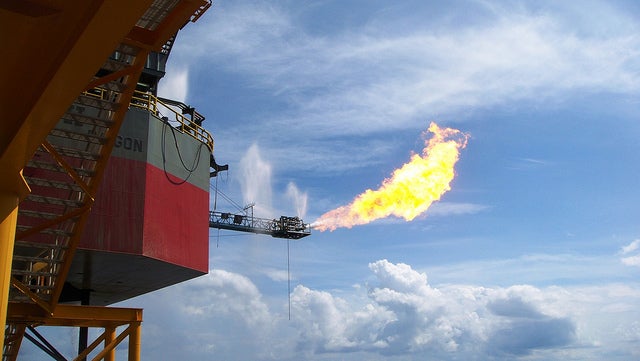 Mexico is getting good news today about a strategy it can use to help meet its 25% greenhouse gas reduction pledge by 2030. A new report conducted by energy research firm ICF International found that by using available and low-cost technologies, Mexico can cut 54% of its methane emissions from the oil and gas sector for less than one peso per ton of carbon dioxide. Not only does this keep a very potent greenhouse gas out of the atmosphere, methane is 84 times more powerful than CO2 in intensifying warming, but by capturing it, methane is the main ingredient in natural gas, Mexico wastes less energy.
Mexico is getting good news today about a strategy it can use to help meet its 25% greenhouse gas reduction pledge by 2030. A new report conducted by energy research firm ICF International found that by using available and low-cost technologies, Mexico can cut 54% of its methane emissions from the oil and gas sector for less than one peso per ton of carbon dioxide. Not only does this keep a very potent greenhouse gas out of the atmosphere, methane is 84 times more powerful than CO2 in intensifying warming, but by capturing it, methane is the main ingredient in natural gas, Mexico wastes less energy.
The Mexican government showed leadership in recognizing the importance of reducing short-lived climate pollutants like methane in its climate pledge to the UN Climate Change Conference. And ICF’s study suggests that reductions in oil and gas methane emissions can be a valuable tool as Mexico considers how it will implement policies to meet its goal.
In the report, commissioned by EDF and co-released with the Mario Molina Center, ICF found that if companies use low-cost measures, such as flares, low-emitting valves and equipment monitors, to control methane that Mexico could reduce more than half of its oil and gas emissions by 2020. Achieving this requires limiting methane from both new and existing sources. Similar to ICF’s other in-country reports in Canada and the U.S., dealing with existing sources is essential as 90% of emissions will come from oil and gas facilities and equipment in operation today.
This opportunity comes at a critical time for Mexico. Energy reforms passed in December 2013 through amendments to Mexico’s constitution have opened up the country’s oil and gas industry to foreign investment for the first time since 1938. Although the response from multinationals have been slow due to the current slump in oil prices, the potential remains for increased emissions post-2020 as Mexico’s energy sector fully opens and the economics of oil production improve. Absent actions to control methane, Mexico’s methane emissions could steadily rise.
Mexico has a unique opportunity to continue to show leadership on this issue by putting in place proper regulations and smart policies that can protect its citizens from unnecessary pollution. Requiring companies that develop oil and gas in Mexico to use sensible controls to limit their methane emissions will also ensure that an uptick in production does not undercut Mexico’s broader climate goals.
Based on the analysis, EDF developed the following policy recommendations with input from the Molina Center:
- Mexico can set and meet an oil and gas methane reduction goal of 55% by 2025;
- Meeting this goal will require development and implementation of regulations and practices to reduce oil and gas methane; and
- Better Mexico-specific data, derived from measurements taken in Mexico, will improve understanding of emissions.
All three recommendations are also in line with IEA’s recent World Energy Outlook, which stresses that oil and gas methane reductions are a major “missed opportunity” for global GHG reductions, that there “is a need to develop methane reduction goals and quantify progress,” while at the same time “regulations will be required to ensure that best practices are adopted by all companies, not just a few industry leaders.”
The Mexican government, through its focus on short-lived climate pollutants, and PEMEX, through its participation in the Oil and Gas Methane Partnership, are recognized leaders on this issue. Better controlling Mexican emissions now, as the country charts a new path forward on exploration and utilization of its oil and gas resources, can provide instant benefits to the climate and for public health.
Image Source: Flickr User Ken Doerr









